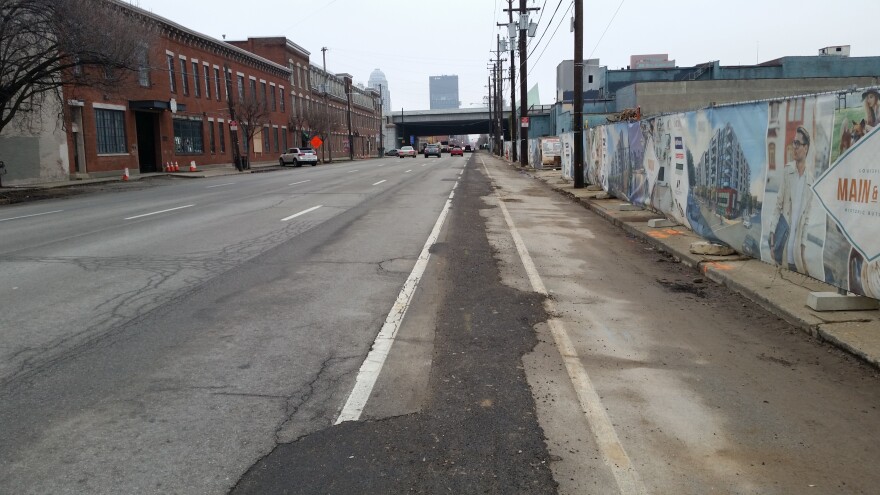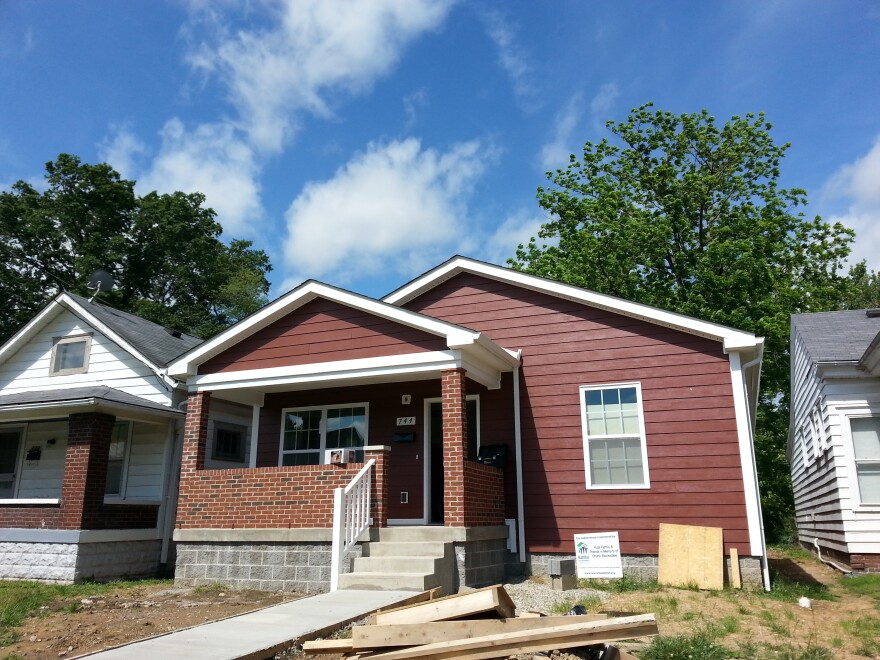The Louisville Metro Council voted Thursday evening to send an $839 million spending plan to Mayor Greg Fischer for final approval.
Council members voted unanimously to approve the spending plan for the upcoming fiscal year, which begins July 1.
The budget approved by the council features investments in public safety, city-owned infrastructure and affordable housing. Council members made about $13 million in changes to Fischer’s initial proposed spending plan, which he presented to the council in late April.
City revenues are projected to increase about 23 percent next year compared with the current year, according to the budget document. That translates to about a 3 percent increase in overall spending, said Daniel Frockt, chief financial officer for Metro government.
By and large, revenues are made up of occupational and property taxes, as well as permit fees and citation fines. Budget allocations are spread across 16 city departments and elected offices, as well as a few external agencies.
When will Fischer sign the budget? That depends on when council delivers it. It takes several days to get amendments, but he usually signs it the week after it's approved.
Here are key details of the $839 spending plan:
Public Safety
The police department has the biggest budget of any single city department. Its $193 million allocation for the coming budget cycle is a nearly 10 percent increase from the current year, according to the budget approved by the council Thursday night.
During the current fiscal year, the department has employed an average of 1,550 people, including about 1,000 police officers, budget documents show.
Public safety is a pressing issue in Louisville. Violent crime is on the rise, and the number of criminal homicides reported by police is nearly on pace with last year’s record high.
Council members contend that public safety is the city’s top priority and ensuring that the police department’s fiscal needs are met is critical.
The city’s Office of Safe and Healthy Neighborhoods — which employs prevention and intervention efforts to combat homicides, suicides and overdoses — is set to receive about $1.1 million in general funds. Council members voted earlier this week in committee to cut nearly $500,000 from the office — funds that were included in Fischer’s initial proposal.
Council members also approved Fischer’s request to spend some $4 million on new vehicles for police, fire and ambulance services.
However, the council nixed a $1.8 million allocation that would have afforded the police department the ability to lease a new downtown headquarters.
Robin Engel, chair of the minority caucus, said leasing a building would bring unnecessary costs to the city.
The council also voted to include about $216,000 for new hires related to public safety efforts: two coroners, a public defender and a Casey’s Law advocate.
Council members also approved a proposal to fund two additional hires to the city's office of addiction services to help combat opioid addiction, and they voted to bolster funding for Volunteers of America by some $515,000 to help fuel an expansion of addiction treatment services.
Fiber Connectivity
After contentious debate during the past few weeks, Metro Council opted to fully fund Fischer’s proposal to build out a fiber internet network across Jefferson County — beginning with a stretch in West Louisville.
Council members questioned the $5.4 million allocation, and the debate intensified after The Courier-Journal reported well-heeled outside interests were taking stake in the issue.
Once complete, the some 90 miles of fiber infrastructure will be leased to companies looking to provide the ultra, high speed connectivity to residents — a move that could generate additional competition among providers and revenue for the city. But Grace Simrall, the head of the city's innovation office, wouldn't speculate on just how much funding it could yield.
Infrastructure
Council members continue to invest heavily in city owned infrastructure repair, such as roads, bridges and sidewalks and guardrails, for instance: The budget proposal approved Thursday night includes nearly $32 million for such efforts.
The city’s need for road and sidewalk repair is stark.
City officials have claimed a nearly $112 million deficit related to road paving. To prevent the deficit from mounting, they estimate about $15 million is needed annually.
Council members elected to bolster Fischer's initial proposal for street repair to more than $22 million. And they boosted sidewalk repair spending to more than $2 million.
Councilman Brent Ackerson, a District 26 Democrat, who is a strong advocate for bolstered spending on road repair, called the boosted allocation for such work a "proper" move.
Bicycle lanes, however, aren't a high priority for the council this year. Council members voted to slash Fischer’s proposed $500,000 allocation for added bicycle infrastructure in half.
The cut in bike infrastructure comes just weeks after the city launched its long delayed bicycle share program -- which costs about $74,000 annually and will likely lead to an increase in the number of cyclists using city streets.
Affordable Housing
Council members opted to keep Fischer’s $14.5 million allocation to help bolster the city’s stock of affordable housing.
But in doing so, they rearranged the funding to put more than $9 million in control of the Louisville Affordable Housing Trust Fund, which many say has been long underfunded. The rest of the allocation will be controlled by the Louisville CARES initiative, which is under the city government's Develop Louisville umbrella.
The move marks the biggest investment in the trust fund since it was created by Metro Council ordinance in 2008. At the time, council members said the trust fund would need $10 million annually to meet the need of the thousands of families in Louisville that struggle to afford housing.
Last year, Fischer and the council allotted $2.5 million for the trust fund, then the largest one-time investment in the program.
Housing advocates estimate the city needs thousands of additional affordable housing units to meet the demand.
Nearly 60,000 households here spend more than 30 percent of their income on housing, and nearly 24,000 of those spend at least 50 percent of their income on housing, according to U.S. Census data.
Families that spend more than 30 percent of their income on housing are considered by the U.S. Department of Housing and Urban Development to be cost-burdened. They may struggle to afford other necessities such as food, clothing and medical care.
Other Investments
Council members cut Fischer’s proposed spending on tree planting to $200,000. The mayor had sought to dedicate $600,000 to tree planting across the city. Louisville officials have long lamented the rate at which trees are eradicated from neighborhoods and rights of way. The absence of trees is credited with a troublesome urban heat island effect and quality of life issues.
Members are looking to bolster spending on the city’s Arts Master Plan by $150,000, bringing the total allotment to $250,000.
Additional mowing cycle for city-owned public rights of way will be funded with a $238,000 allocation, according to the budget ordinance approved by the council Thursday.
And council members are looking to set aside some $250,000 to begin a program that would install clear, plastic boards over windows and doors of vacant structures. The Courier-Journal reported this week that the program is expected to help reduce vandalism and squatting in thousands of vacant structures across the city.







